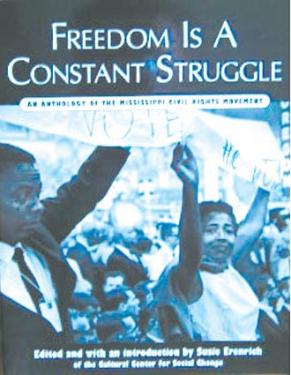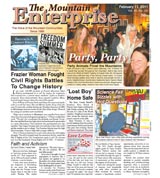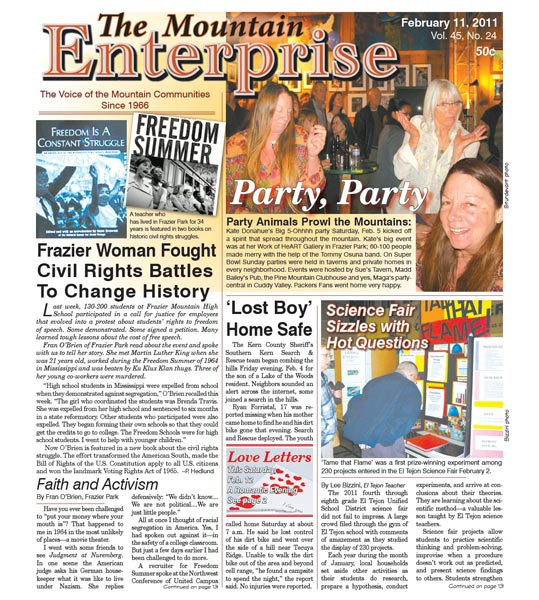Last week, 130-200 students at Frazier Mountain High School participated in a call for justice for employees that evolved into a protest about students’ rights to freedom of speech. Some demonstrated. Some signed a petition. Many learned tough lessons about the cost of free speech.
Fran O’Brien of Frazier Park read about the event and spoke with us to tell her story. She met Martin Luther King when she was 21 years old, worked during the Freedom Summer of 1964 in Mississippi and was beaten by Ku Klux Klan thugs. Three of her young co-workers were murdered.
“High school students in Mississippi were expelled from school when they demonstrated against segregation,” O’Brien recalled this week. “The girl who coordinated the students was Brenda Travis. She was expelled from her high school and sentenced to six months in a state reformatory. Other students who participated were also expelled. They began forming their own schools so that they could get the credits to go to college. The Freedom Schools were for high school students. I went to help with younger children.”
Now O’Brien is featured in a new book about the civil rights struggle. The effort transformed the American South, made the Bill of Rights of the U.S. Constitution apply to all U.S. citizens and won the landmark Voting Rights Act of 1965. –P. Hedlund
Faith and Activism
By Fran O’Brien, Frazier Park
Have you ever been challenged to “put your money where your mouth is”? That happened to me in 1964 in the most unlikely of places—a movie theater.
I went with some friends to see Judgment at Nuremberg. In one scene the American judge asks his German housekeeper what it was like to live under Nazism. She replies defensively: “We didn’t know…. We are not political….We are just little people.”
All at once I thought of racial segregation in America. Yes, I had spoken out against it—in the safety of a college classroom. But just a few days earlier I had been challenged to do more.
A recruiter for Freedom Summer spoke at the Northwest Conference of United Campus Christian Fellowship. I was attending as a delegate, representing Pacific University. All weekend I had been very vocal about the necessity of acting on Christian principles, not just talking about them.
Now this man was giving my own words a new meaning. At first he told about enabling all adult citizens of Mississippi to vote, regardless of color. That meant teaching black people to answer purposely difficult questions about the state constitution, used to block them from voting. The same questions were not asked of white voters.
“That lets me out,” I thought with some relief. I had only the barest knowledge of my own California constitution. I’d look like a fool trying to teach anyone else’s.
Then the recruiter told about Freedom Schools and community centers.
“If adults come to voting classes and teenagers come to the Freedom School, someone will have to look after the younger children.”
He went on to explain how this was to be not merely “babysitting” but a real learning experience. As he elaborated, describing exactly the type of activities I had been doing with children for years, I felt my comfortable excuse crumbling out from under me like a badlywarped stepladder.
After the presentation, I picked up an application form and filled it out. While I was still dithering about whether to mail it or not, I saw Judgment at Nuremberg.
Sending the application was my first act of faith; I had no idea how I would proceed if I were accepted. Traveling to Oxford, Ohio, a place of which I had never heard, was another. It involved an arduous bus trip for five nights and four days, including one night in a bus station. I was alone until transferring to a local bus in a small town in Indiana. There I met a few other volunteers on their way to Oxford.
The training sessions at Western College for Women made me feel like a kindergartner thrust into the sixth grade. I could define “participatory democracy” for a test but I never had written to a congressman, much less taken part in a demonstration. I didn’t even know the songs.
The first morning we learned that three of our men were missing in Neshoba County. Not mincing words, Bob Moses informed us that when people disappeared at night in Mississippi, “missing” meant “dead.” The same thing could happen to any one of us.
Yet at no time did I doubt I should be there. Sometimes I wondered why; often I wondered what I would do and how on earth I could possibly be useful; but never did I use the question word “if.” It did not occur to me I might have made a mistake in coming. I knew I was meant to be exactly where I was. That is faith.
In my case, it led to a unique type of activism. There is a saying, “God doesn’t call the qualified; He qualifies the called.” I discovered the truth of that during training. By the end of the week I felt a part of the group. I even helped with a drama workshop.
Many times in the years since Mississippi I have caught myself thinking, “I can’t do this!” only to find out that I can. Not everyone can do the same things — and how boring it would be if we did! But everyone can do something. God planned it that way.
Next Week: Journey Into Light
This is part of the February 11, 2011 online edition of The Mountain Enterprise.
Have an opinion on this matter? We'd like to hear from you.



